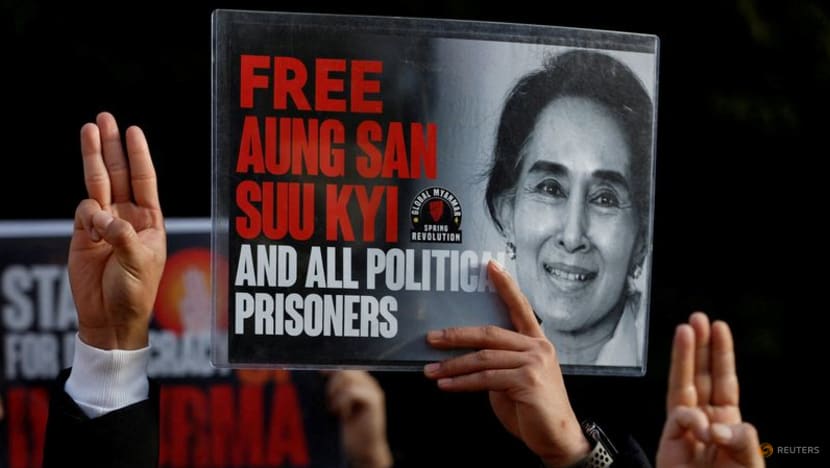
SINGAPORE: More than three years after their arrest and imprisonment in a military coup, Myanmar’s former state counsellor Aung San Suu Kyi and president Win Myint were reportedly moved out of jail to house arrest last Wednesday (Apr 17).
Army spokesman Zaw Min Tun said this was due to extreme heat and their old age. Both are in their 70s.
Why now?
The announcement came just as Myanmar marked its yearly Thingyan or New Year festival.
During this period, it’s common for prisoners to be pardoned: More than 3,000 across the country were freed that Wednesday.
It’s also a time of the Myanmar military facing strong resistance from ethnic armed groups as well as the opposition National Unity Government’s (NUG) civilian troops, known as the People’s Defence Force.
This combined resistance has managed to seize several territories along the Thai and China border.
The NUG also recently said it bombed two of the Myanmar army’s bases in Nay Pyi Taw – significant because the junta views the capital city as its fortress.
The military has increasingly found it difficult to fend off drone attacks by the resistance. It has also lost soldiers who either fled the country or surrendered.
Against this backdrop, Ms Aung San Suu Kyi’s son Kim Aris has said that he fears his mother being used as a “human shield”.
What’s behind the move?
“Up to this point, what we do know is that (the move) was framed as an act of compassion to alleviate the senior leaders’ suffering from the very high warm temperatures,” said the ISEAS-Yusof Ishak Institute’s senior fellow Moe Thuzar.
But she added that uncertainty over the exact locations they had been moved to “raises questions”.
Observers have pointed out there could be diplomatic strings being pulled.
Prior to the reported prison transfer, there had been several high-level foreign engagements with the Myanmar army.
This included former Thai foreign minister Don Pramudwinai’s meeting with Ms Aung San Suu Kyi in July last year.
And in recent months there has been shuttle diplomacy between China and Myanmar, including a meeting between Chinese special envoy Deng Xijun and Tatmadaw – Myanmar’s military – chief Min Aung Hlaing.
Asked if China could have played a role in Ms Aung San Suu Kyi’s move out of prison, University of Hong Kong assistant professor Brian Wong said “the probability is most certainly there”.
“China has substantial interests in expedient resolution of the crisis in Myanmar in virtue of the damage on its economic interests; the spillover in terms of border insecurity,” he said.
“It’s clear Beijing is losing patience and also to some extent, faith in the ability of the Tatmadaw to deliver order and security.”
During her time in jail, Ms Aung San Suu Kyi reportedly suffered from gum pain and had been in discomfort.
“Whether or not (the move) is actually taken as a sincere gesture – and confirmed – is still open to question, as has been observed by the wider international or regional community,” said ISEAS’ Moe Thuzar, who coordinates the Myanmar Studies Programme at the think-tank.
“But for the sake of the senior leaders, having to serve jail term outside a prison cell would be more preferable.”
To date, the Myanmar army has turned a deaf ear to pleas for the release of Ms Aung San Suu Kyi and Mr Win Myint.
But this latest move, viewed alongside other recent actions by Myanmar’s military leadership, could hint at what Peace Research Institute Oslo researcher Amara Thiha suggested as “upcoming mediation”.
At Armed Forces Day in March, General Min Aung Hlaing appeared to tone down his rhetoric against the NUG, after previously calling for the “annihilation” of who he referred to as “terrorists”.
And early in 2024, the junta sent a permanent secretary to attend an ASEAN Foreign Ministers’ Retreat – a breakthrough after years of refusing to accept the regional bloc’s demands to send a non-political representative to such meetings.
source : channelnewsasia
